How long do bananas last? Oh, that's a loaded question for sure. It all depends on proper banana storage and how old your bananas were when you got them.
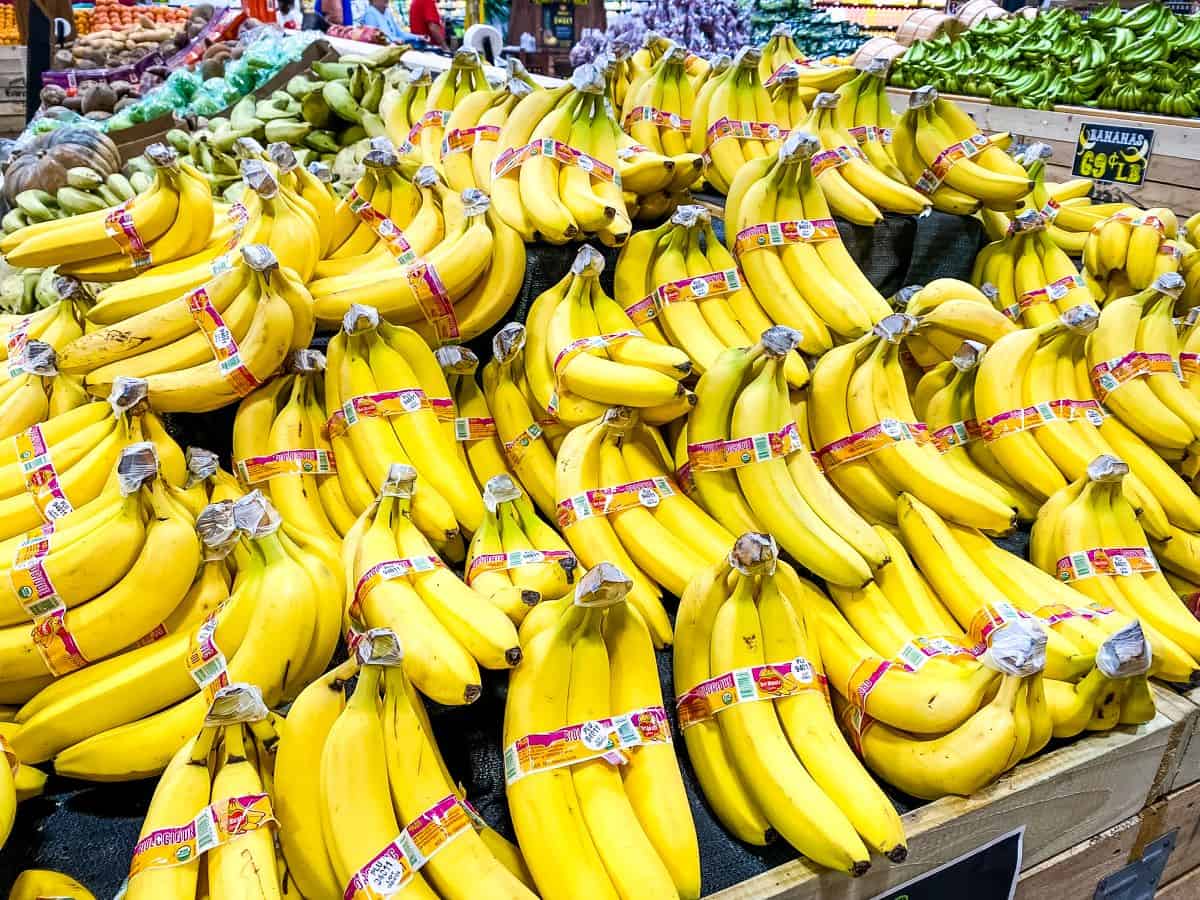
There's nothing like buying a bundle of bananas at the store and then going to grab one a day or two later only to find that when you remove the peel, it's mushy and gross inside.
Learning to properly store bananas and how to tell when they're ripe will help you get the most out of your banana bunch!
With bananas being one of the most popular fruits, relatively affordable, and quite a nutritious one, it's no surprise that bananas can be used in so many recipes. Some of our favorite banana recipes can use fresh bananas or frozen ones. For breakfast, we love vegan banana oat pancakes, and as a snack this tasty buckwheat banana bread, and dessert either an apple banana smoothie or some vegan banana brownies,
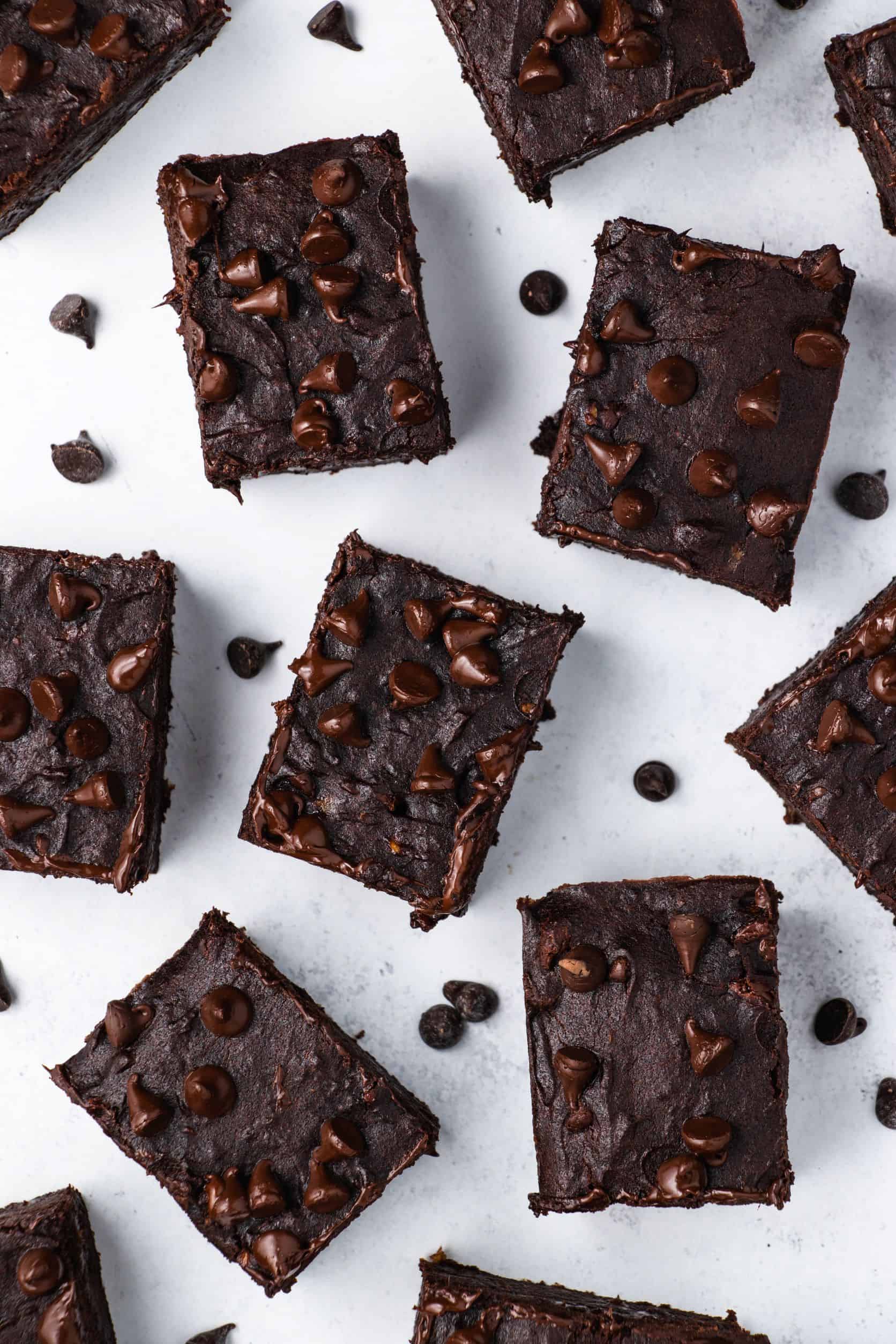
Why eat bananas?
Bananas are rich in many nutrients and they may even help improve and lower blood sugar levels.
Bananas are a good source of fiber and have been shown to help support proper digestive health.
They're great for helping you feel fuller for longer which may aid in weight loss and they have various nutrients and antioxidants that help promote a healthy heart (source).
How long do bananas last at room temperature?
Storing your bananas on the counter at room temperature is a very common method of storing them.
The problem with storing your bananas at room temperature is that they don't last as long as they could when properly stored via other methods.
Did you know bananas are picked off the banana tree when they're green?
If you grabbed a bunch of green bananas or unripe bananas from the grocery store or farmer's market, and need to ripen them, hang them on your banana hanger, off the kitchen counter, and they'll be ripe in about 2-4 days.
Your banana bunch should be stored hanging and away from other fruits, especially apples, if possible.
Laying your bananas flat on the counter will help them perish faster.
Storing your bananas at room temp, they should last up to 5 days or so.
And, bananas, like onions and potatoes, prefer to be stored at cooler temps, in a dark room without direct sunlight.
If you wish to extend the shelf life of bananas and keep them longer, try another storage method.
Another fun fact about storing bananas: If you wrap the stems with plastic wrap and aluminum foil once they've started to ripen, this is supposed to help them last longer and not turn as fast.
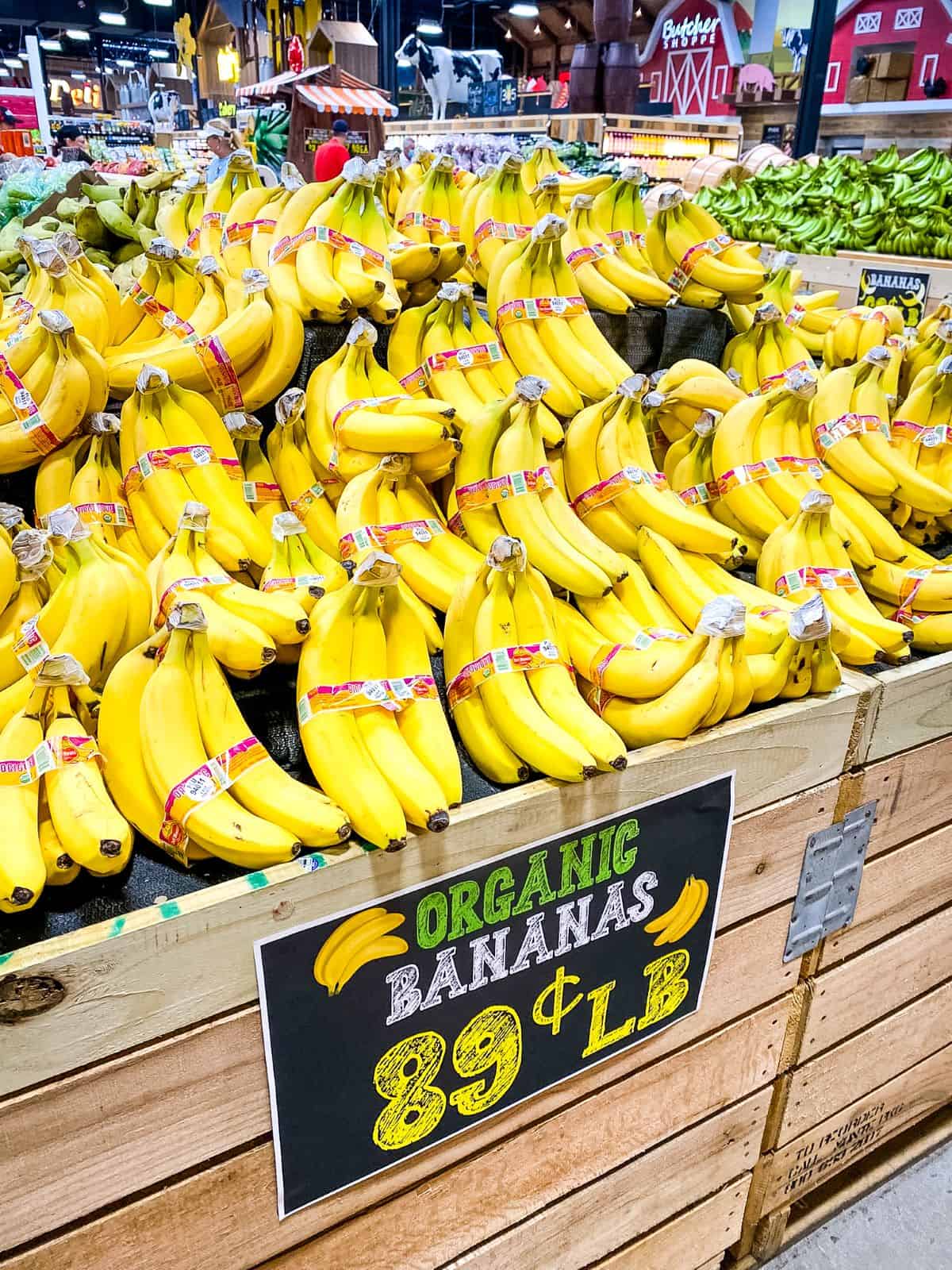
How do you know when bananas are ripe?
There are various ways to tell when you have the perfect ripe banana.
Here are some of the things to be on the lookout for:
A ripe banana will be yellow as opposed to green which is one of the telltale signs of an unripe banana.
Also avoid the bananas that have any green on the stem, as they're not ripe yet.
You may also see brown bananas or yellow bananas with brown spots, these are ripe and ready to eat.
A ripe banana should be soft when squeezed and should easily snap off the stem.
When peeling a ripe banana, you shouldn't feel any resistance from the banana peel and it shouldn't make any cracking or ripping noises while peeling.
Eat your ripe bananas as soon as possible, they'll only last a couple of days.
With overripe bananas, make this Vegan Banana Bread!
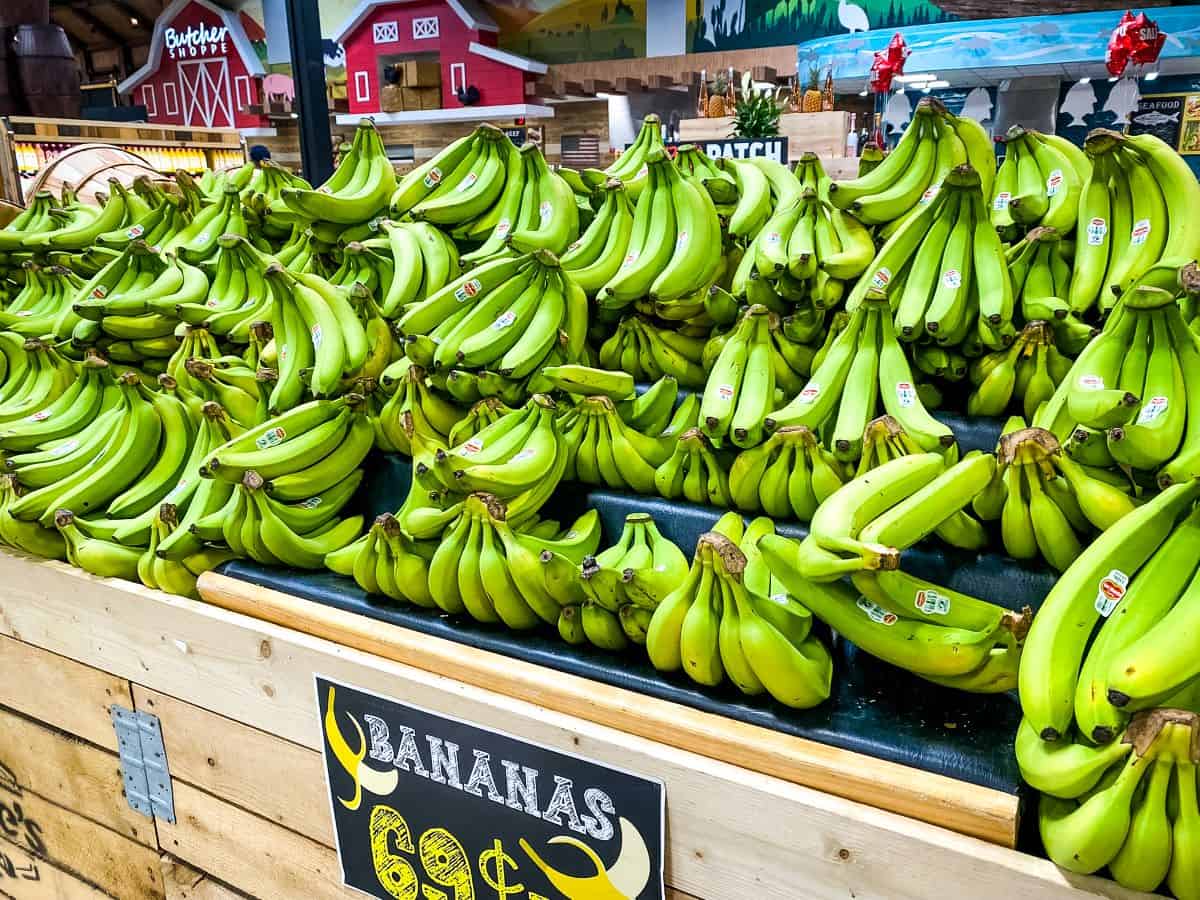
How do you ripen a banana quickly?
If you want to take your green unripe bananas and make them ripen fast, here are a few suggestions:
- Keep the bunch together as they'll help ripen the rest of the bananas faster.
- Put your bunch in a brown paper bag and only close it loosely. This will speed up the ripening process of the banana because ethylene gas will start to build up and move around inside of the bag and that ripens any fruit around it. Don't forget to check on the bag often so you don't wind up with overripe bananas.
How do you know when bananas are overripe?
Oh no, did you let your banans get overripe?
Don't worry, it happens, but here are a few signs and things to look out for to help you avoid letting your bananas get overripe!
If you open your banana and you see that it's squishy, is all over pale brown, or dark in color, toss the banana out, as it's no longer edible.
If you see black spots all along the inside of the banana, ditch the bananas, they're not safe for consumption either.
How do you tell if bananas have gone bad?
Other ways to tell if your banana has gone bad are checking for mold growth.
If you see visible mold on the banana skin, it's not safe to eat.
If you see liquid dripping from the bananas or pooling underneath the bunch, that's another sign that they have gone bad.
If you have any questions, peel the banana and if it smells funny, looks odd, or feels too squishy, it's bad, don't use it.
As the saying goes, "when in doubt, throw it out".
Should you refrigerate bananas?
Tossing unpeeled bananas in the refrigerator will slow down or stop your bananas from ripening.
However, it will cause the skin to change color and become very dark, but the flesh of the banana that you eat is still good despite the outside peel color.
If you wish to refrigerate your bananas, wait until they're fully ripe. Doing so will also keep them from becoming over ripe.
They should last about 3-5 days in the fridge once ripe.
You can also refrigerate cut up banans if desired.
They will only last a couple of days and will turn brown faster than if you didn't cut them and left them in the peel.
But, you can also prevent them from browning as fast by storing them in an airtight container with some vinegar or lemon juice.
If desired, you can rinse the vinegar or lemon juice off of the cut up bananas before consumption as this can add a slightly different taste to your fruit.
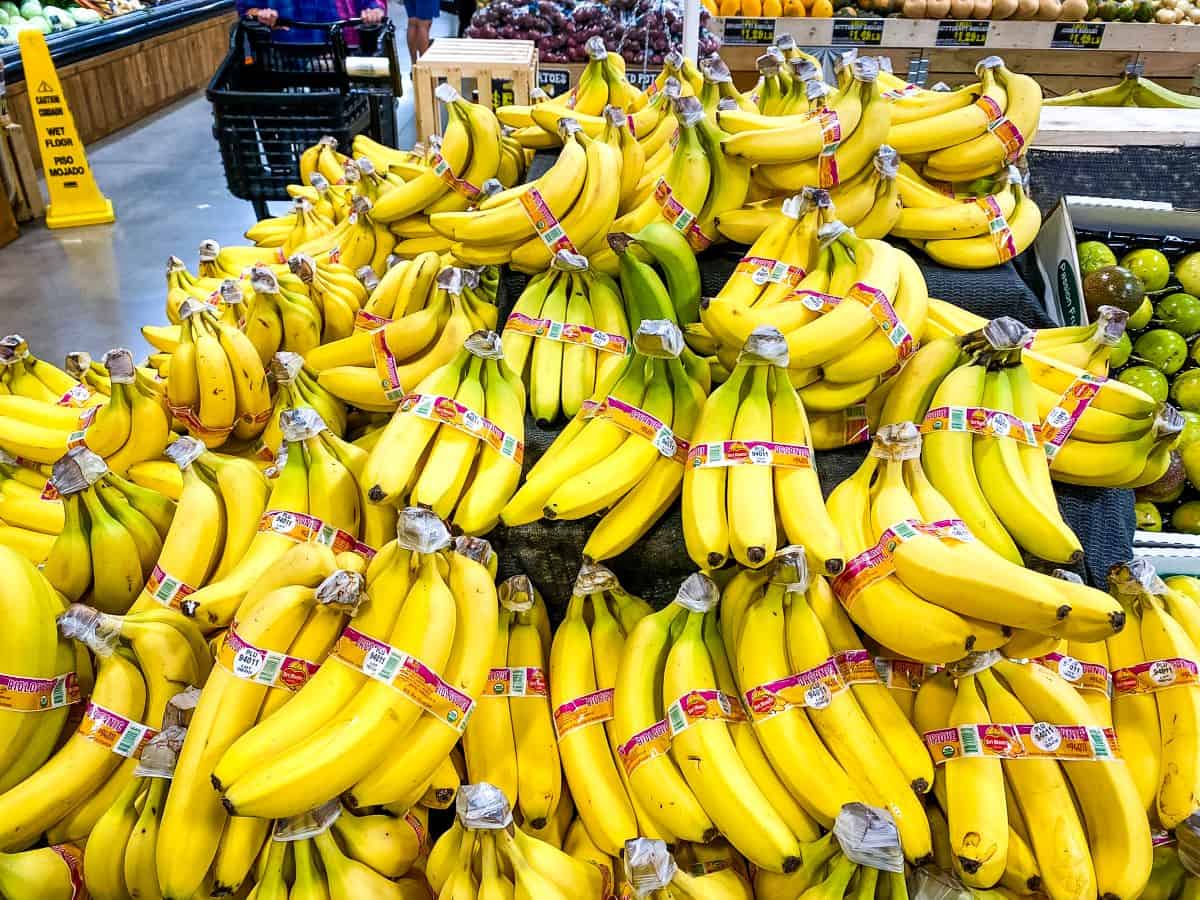
Can you freeze bananas?
Yes, you can freeze bananas.
In fact, frozen properly, your bananas will keep for up to 6 months!
This is especially a good idea to do when you want to keep your bananas to use for later or have some bananas that are on the verge of becoming overripe or are starting to discolor but you want to use them later (this is the best way for using in smoothies!)
There are a few different ways you can freeze bananas.
You can store whole bananas with peel still intact or partially opened bananas wrapped in plastic wrap and aluminum foil and then placed in a freezer safe container or plastic bag with air removed before putting them in the freezer.
Additionally, you can remove the peel from your banans and place them on a parchment paper-lined tray and place them into the freezer to freeze individually until they're solid.
Once frozen solid, transfer them to a freezer bag and remove the air before sealing them, labeling them, and placing them back in the freezer for up to six months.
Are you still looking for another way to freeze extra bananas? Don't worry, I have you covered my friend!
Try peeling them and then cutting them into ½-inch thick banana slices. Put the cut up banana rounds on a parchment paper-lined baking sheet and freeze until they're solid. This typically takes about an hour or so.
Once frozen, remove from the freezer and transfer to a freezer safe ziploc bag or into a few air-tight containers.
Cut bananas will last about 3 months in the freezer.
Freezing bananas in coin size pieces is a great way to make a healthier vegan ice cream alternative. Chocolate Nice Cream is a fan favorite and only requires 3 ingredients to make (frozen bananas being one of them!)
When you are ready to use your frozen bananas, no matter how you stored them, remove them from the fridge and let them thaw in a bowl or container. As they defrost, it's common for frozen bananas to release some moisture.
It's also very helpful to note that your frozen bananas will turn brown and start to discolor, no matter how you choose to store them.
But it's important to understand that they're still perfectly safe to eat when you're ready to use them.
Now that you know everything there is to know about properly storing your bananas on the counter, in the fridge, cut up, whole, or even in the freezer, it is safe to grab a few extra bunches of bananas at the store on your next grocery run so you can make some more delicious banana recipes!
And don't be afraid to grab a bunch or two of those green bananas so you can have a few more days for them to ripen up before you have to use them in a recipe or gobble them all up.
More produce storing tips
©Watch Learn Eat. All content and images are copyright protected, and are not to be used or republished without prior permission.


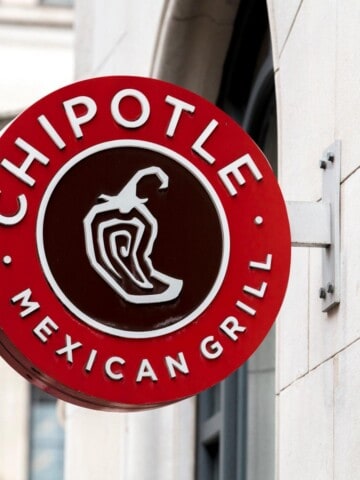
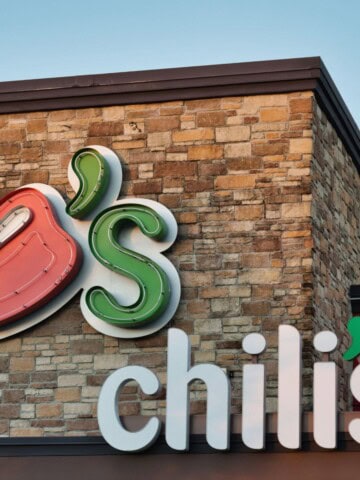
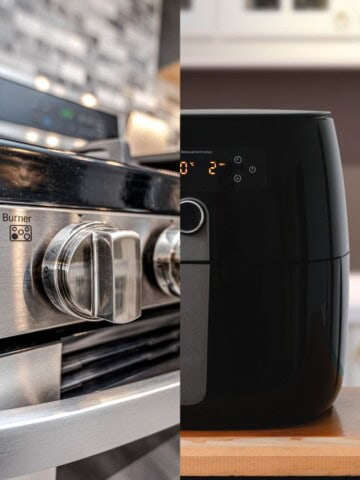
Leave a Reply